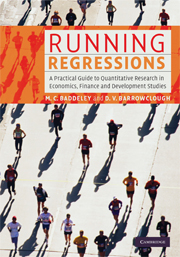 Running Regressions
Running Regressions Book contents
- Frontmatter
- Contents
- List of figures
- List of tables
- List of boxes
- Acknowledgements
- List of acronyms
- How to use this book
- Part I Simple regression and data analysis
- Part II Multiple regression and diagnostic testing
- Part III Time-series econometrics
- Part IV Advanced topics
- 11 Panel estimation
- 12 Binary dependent variables
- Index
- References
11 - Panel estimation
Divorce and income
Published online by Cambridge University Press: 05 June 2014
- Frontmatter
- Contents
- List of figures
- List of tables
- List of boxes
- Acknowledgements
- List of acronyms
- How to use this book
- Part I Simple regression and data analysis
- Part II Multiple regression and diagnostic testing
- Part III Time-series econometrics
- Part IV Advanced topics
- 11 Panel estimation
- 12 Binary dependent variables
- Index
- References
Summary
Economic issues include:
Rational choice theory
Economics and happiness
Econometric issues include:
Heterogeneity bias
Pooling and panel estimation
Data issues include:
Combining cross-sectional and time-series data
The issue
Economic analysis is not confined to the study of money and finance. Some economists use their tools for ‘theoretical imperialism’ – i.e. to analyse issues affecting human happiness and welfare that are usually the focus of sociological and/or psychological analysis. How is such an economic approach justified? Economic imperialists take the basic economic principle of balancing benefits and costs and apply it to some of the decisions that people make every day, e.g. choices about drug use, criminal behaviour, decisions to get married and/or divorced etc. The idea is that people engage in certain behaviours, even ostensibly anti-social or destructive behaviours, because the benefits outweigh the costs. This is the essence of the rational choice theory made famous by Gary Becker.
Other economists have also used economic tools to illuminate social issues and problems. In this chapter we illustrate how economics and econometrics can be used to illuminate an area of family life that has been the focus of many analyses by economists: marriage and divorce. In this chapter, we focus on divorce data from 45 US states over the period 2002–4 so our data set has both a spatial/geographical dimension and a temporal dimension.
- Type
- Chapter
- Information
- Running RegressionsA Practical Guide to Quantitative Research in Economics, Finance and Development Studies, pp. 249 - 263Publisher: Cambridge University PressPrint publication year: 2009


